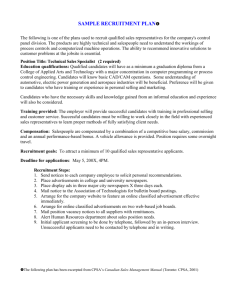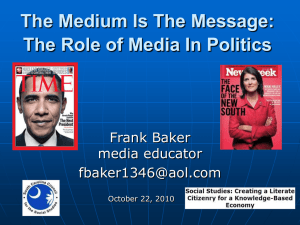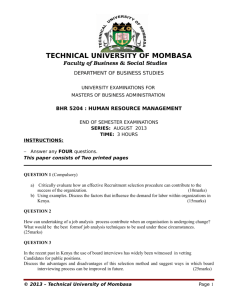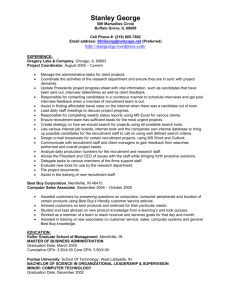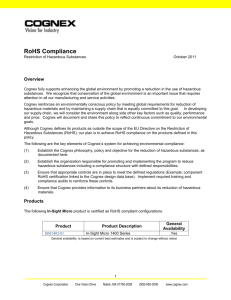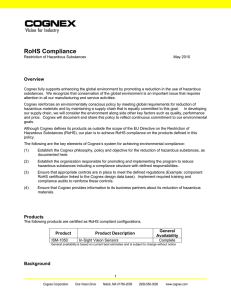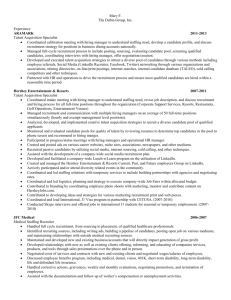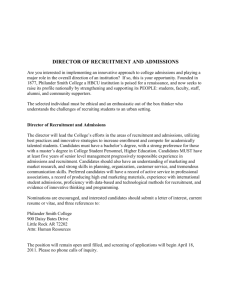Recruitment
advertisement
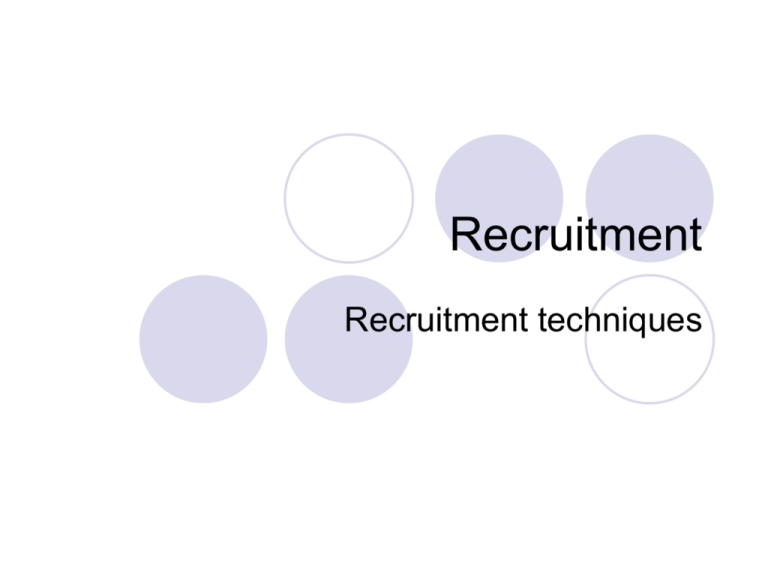
Recruitment Recruitment techniques Recruitment involves: Finding possible candidates for a job or function. It may be undertaken by an employment agency or a member of staff at the business oragnisation looking for recruits. It may involve advertising in the recruitment section of a newspaper. It is also an activity by which a retailer generates a list of job applicants. One of the criteria for recruitment is: Merit recruitment - which is a system of hiring public servants on the basis of qualifications rather than on party preference or other considerations Beside by merit, candidates may be considered for a job based on many different criteria and methods, some of them becoming more and more popular A growing number of companies (General Motors Corp. etc.) show some modern tendencies: They are no longer satisfied with traditional job interviews Instead, they are requiring applicants for many white-collar jobs (doctors, lawyers, people performing less laborious tasks)to write tests, roleplay exercises, simulate decision-making exercises and brainteasers (problems which are fun to solve) Others put candidates through a long series of interviews by psychologists The tests are very elaborate (complicated) and demanding: They are not about basic techical skills for which many candidates have been tested Rather, employers want to evaluate candidates on intangible qualities: Is she creative and entrepreneurial? Can he lead and coach? Is he flexible and capable of learning? Does she have passion and a sense of urgency? How will he function under pressure? Will the potential recruit fit the corporate culture? The tests can be short or very long: Some tests take an hour, others take up to two days Companies are becoming more careful about hiring: ten years ago candidates could win a top job with the right look and the right answers to questions such as: Why do you want this job? Now, many candidates have to face questions and exercises intended to find out HOW they get things done Here are some examples: They may have to describe not one career accomplishment but many (in this way the patterns of behaviour emerge) They get questions like: Who is the best manager you ever worked for? What is your best friend like? The answers reveal much about candidate’s management style The reasons for this kind of interrogation: Many hires (someone who starts to work for a company) work out badly About 35% of recently hired employees are considered failures according to the Center for Creative Leadership which surveyed nearly 500 chief executives The cost of hiring the wrong person is sometimes huge: searching and training can cost from 5000 up to 250000 dollars The problem could be the following: Years ago, employers looked for experience (has a candidate done this before?) But, having experience in a job does not guarantee that you can do it in a different environment Unfortunately, most companies have not yet shifted to this practice What happens in real life is: Some do not see the need that such testing is worth the cost Still, the white-collar testing is growing in popularity. The reasons for this is the sense of limitations that is present in old-fashioned interviews. With so little information on which to base a decision “most people hire someone they like, rather than the most competent person” Research has shown the following: Most decision makers make their decision whom to hire in the first five minutes of an interview The first impression seems to be the strongest point of a potential employee The rest of the interview time the decision maker uses to rationalise their choice The last researches show that: Even those companies that have not started extensive testing have toughened their hiring practices Many of them now do background checks (looking for signes of drug use, violence or sexual harassment) The newest testing aims to measure skills in communications, analysis and organisation, attention to detail and management style An example: Cognex Cognex is the world’s leading supplier of machine vision sensors and systems Cognex recognises employees who exceed the company’s high standards with many rewards This company hires top professionals who are interested in working in a high-energy, fastmoving, growth company with leading-edge machine vision technology, strong values, and a corporate culture unlike any other in the world Career benefits: Working at Cognex provides you with many unique opportunities to enjoy: Friday after-work “socials”, free movie nights, a fitness centre and a game room...and: Medical insurance, dental insurance, employee savings plan, disability insurance, paid time off, holidays.... Cognex recruitment: Cognex is always on the lookout for bright new talent, and actively seeks to hire recent college graduates with intelligence, ambition and drive. At Cognex you’ll have the opportunity not only to apply your education but to continue it, as you work side-by-side with leading machine vision experts Cognex intern programs Cognex has a variety of internship and co-op positions available on a yearround basis These positions are open to bright, dedicated and enthusiastic college students who are eager to obtain realworld experience from an industry leader. A personal experience: a Cognex employee testifies “By working at Cognex as a co-op student from Northeastern, I learned the skills necessary to become a successful electrical and computer engineer. These skills benefited me both while in school and in the work force. The knowledge that I gained led to a full time position at Cognex that continues to provide me with challenging and rewarding work.” The letter of application: The letter of application can be as important as the CV in that it often provides the first direct contact between a candidate and an employer. If this letter is not well written and presented, it will make poor impression. The letter of application normally contains four paragraphs in which you should: Confirm that you wish to apply and say where you learned about the job Say why you are interested in the position and relate your interests to those of the company Show that you can contribute to the job by highlighting your most relevant skills and experience Indicate your willingness to attend an interview (and possibly say when you would be free to attend). Job advertisements in three European countries: Are executive positions in different countries advertised in the same way? Most British advertisements mention not only salary, but also other material incentives. This is not the case in French and German ads: it is left to applicants to raise this question themselves. The reason for this may be that in France and Germany the information about salary is given by the level of experience and qualifications demanded. On the other hand, French and German adverts are very precise about qualifications: they usually demand “a degree in...” not simply “a degree”. French ads go even further: they may specify a particular set of institutions or schools to which they give priority. In UK they usually seek “graduates”, and their ads suggest uncertainty. It often happens that those who are qualified beyond degree level make employers nervous. In France and Germany it is difficult to be overqualified: many people in their executive boards have doctorates which they regard as ideal training. British managers are not selected primarily for their intelligence. Instead, the British give importance to social, political and leadership skills. As to personal qualities, the British look for energy, ability to communicate and motivate. The German adverts want candidates with sound knowledge, experience and competence in their field. They rarely recruit at all. French ads refer to intellectual qualities like analytical capacity and independence. Even the tone of the job ads is different in the three countries: French and German ads are boringly direct while British sound exciting. Compound nouns Present simple and present continuous II Compound nouns: match one noun from each column to form a compound noun Risk Computer Problem Award Wage Wine Law trouble Earner Winner Breaker Shooter Programmer Solver Importer taker Complete the following sentences with the correct compound nouns: 1) 2) 3) 4) 5) I don’t like John. You never know how the deal is going to end with him, you just can’t have certainty. He’s a real ___________. Mary is extremely intelligent: she can deal successfully with just about anything. She truely is a ___________ . He never respects regulations of any kind. He’s a typical ___________. Our father is the only ____________ in our family. All of us depend on him for food and clothes. The __________ did not show up to collect his prize, so we’ll have to send it to him by mail. Present simple and present continuous: put the verbs in brackets in either of the two tenses You (enjoy) yourself or would you like to leave now? – I (enjoy) myself very much. I (want) to stay to the end. How you (get) to work as a rule? – I usually (go) by bus but tomorrow I (go) in Tom’s car. Ann (make) a dress for herself at the moment. She (make) all her own clothes. This car (make) a very strange noise. You (think) it is all right? – Oh, that noise (not matter). It always (make) a noise like that. Why you (smoke) a cigar, Mrs Pitt? You (not smoke) cigars as a rule. – I (smoke) it because I (want) the ash. This book (say) that cigar ash mixed with oil (remove) heat stains from wood. That film (come) to the local cinema next week. You (want) to see it? Stop! You (not see) the notice? – I (see) it but I can’t read it because I (not wear) my glasses. What it (say)? - It (say) “These premises are patrolled by guard dogs”. I (think) it is a pity you don’t take more exercise. You (get) fat.

